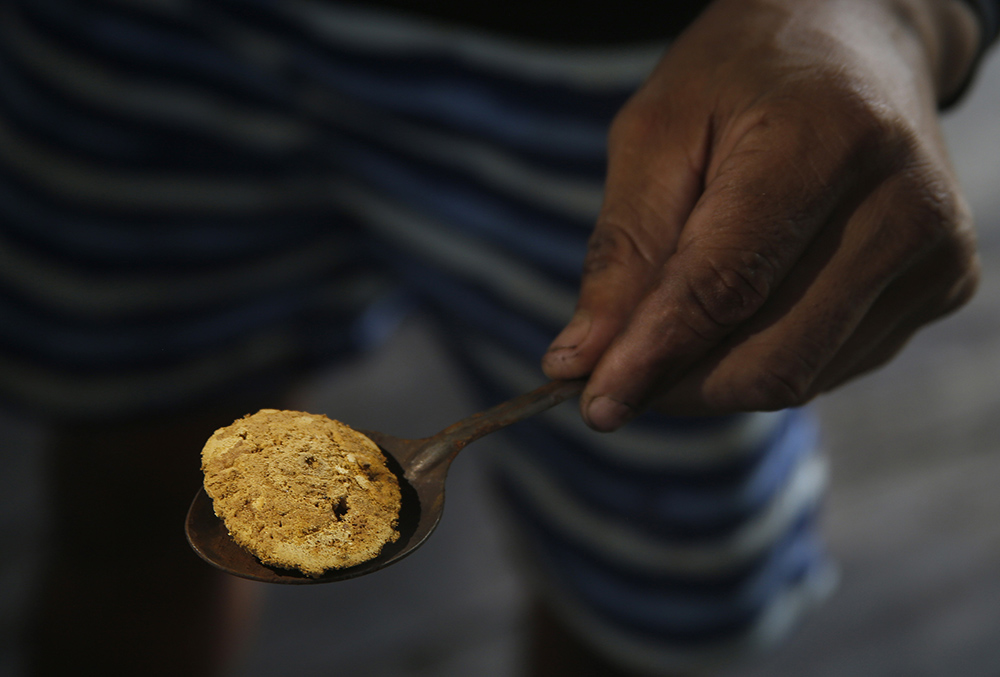
An illegal miner shows gold extracted from the Madeira River, in Nova Olinda, Amazonas state, Brazil, on Nov. 26. (AP/Edmar Barros)
Hundreds of illegal mining dredges converged on Brazil's Madeira River in November, creating a floating city near the town of Autazes in the state of Amazonas. The rush — involving as many as 600 vessels, by some estimates — apparently began after news spread that a miner operating illegally there had found gold.
Although the unprecedented event attracted the attention of environmentalists around the world, illegal mining in the Madeira River and other Amazonian waterways is nothing new. Politicians — who sometimes are involved in the ventures — tend to downplay the environmental and social damage caused by illegal mining.
The problem has intensified since President Jair Bolsonaro took office in 2019, partly because of his public support for the miners. In addition, a top government official recently authorized seven mines in protected areas, including Indigenous reserves.
Several Catholic Church organizations have spoken out about illegal mining and its impacts, but the complexity of its causes and the great financial interests behind it transform their effort into a David-and-Goliath kind of struggle.
"Illegal mining in the Amazonian rivers requires great investment. Those organizations use helicopters, airplanes and heavy machines in their operations. There's evidence that they rely on local politicians' support," Italian-born Comboni Fr. Dario Bossi, a founding member of the Brazilian bishops' Mining and Integral Ecology Commission, told EarthBeat.
Indeed, a delegation of local mayors traveled to Brasilia Dec. 1 to meet with Brazil's defense minister and with legislators from Amazonas, in an effort to pressure them to suspend a police crackdown on the mining boats.
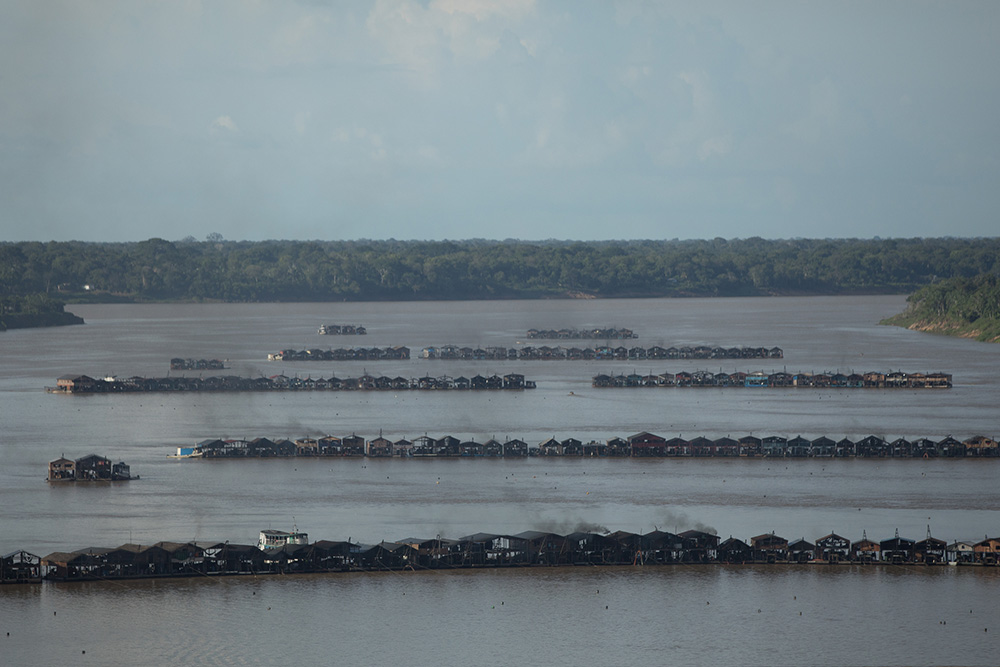
Gold mining rafts and dredges are seen on the Madeira River in Brazil. (Greenpeace Brazil/Bruno Kelly)
Several members of Congress from Amazonas told the press that although they lamented the environmental impact of mining, people — especially the poor — should be allowed to continue working.
"Every time an operation against mining is launched in the Amazon, local politicians show their support to miners and claim that it's an activity that generates income," Danicley de Aguiar, an activist with the environmental group Greenpeace, told EarthBeat. "No doubt it does, but that's a shortsighted idea. The price we'll have to pay later is much higher."
Miners help bankroll the election campaigns of Amazonian politicians, de Aguiar said, adding, "And many times, the politicians themselves are miners — not the ones working in the mud, but those who profit" from the mining.
Amazonian rivers wash vast amounts of sediment from the Andes Mountains in western South America to the Atlantic Ocean on the eastern side of the continent. The sediment contains minerals, including gold. Early miners panned for gold along the rivers, but their modern counterparts use large dredges, suction hoses and sluices.
In rivers, the operations churn up huge amounts of mud, increasing the turbidity of the water, which affects aquatic fauna. When miners move inland, dredging along smaller rivers or in forested areas where rivers used to flow, the destruction is compounded, leaving a denuded landscape pocked with water-filled craters.
A longer-lasting impact comes from mercury used to separate tiny flecks of gold from fine sediment. Typically, workers mix mercury with the gold-bearing sand to form a lump, then blast it with a torch, vaporizing the mercury and leaving behind a lump of gold.
Advertisement
Direct exposure to mercury can cause health problems for workers, including lung, kidney and neurological problems. This kind of unregulated or poorly regulated small-scale mining is also the largest source of atmospheric mercury, which can enter the food chain when it settles onto the land and oceans.
And although miners claim that they don't use mercury when mining in rivers, de Aguiar has his doubts.
"If the government is unable to minimally control the flux of mining boats, how can we be sure they are not using mercury and dumping it in the river?" he asked.
Dredging in riverbeds also stirs up heavy metals — including mercury that occurs naturally in some Amazonian soils — or pollutants deposited in the past, re-contaminating the water and its plant and animal life, de Aguiar said.
When mercury in rivers or streams comes into contact with bacteria, it changes into a form that accumulates in the flesh of fish. The toxic metal becomes more concentrated higher up the food chain, as smaller fish are eaten by larger fish, which are consumed by humans, not only in rural areas but also in large cities like Manaus and Belém.
Consuming large amounts of mercury can cause neurological problems, especially in children, and in pregnant women the mercury can affect the developing fetus.
But mercury is not the only health hazard posed by illegal gold mining in Brazil. For decades, church workers have denounced the presence of illegal miners in the Yanomami Indigenous Territory, an area that borders Venezuela and is slightly larger than the U.S. state of Indiana.
Some Yanomami continue to shun contact with wider Brazilian society, making them especially vulnerable to diseases introduced by miners, even common ones like colds or flu. With the COVID-19 pandemic, however, the danger is great even for Yanomami who have resistance to common diseases.
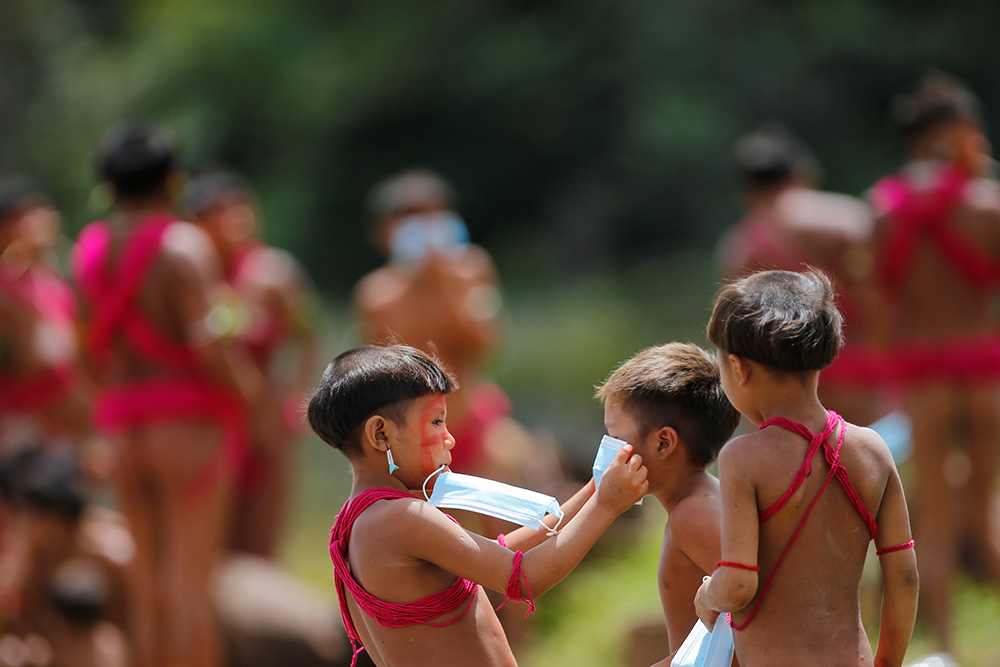
Young Yanomami try on protective masks as members of a medical team with the Brazilian army examine members of the tribe in the state of Roraima July 1, 2020, during the COVID-19 pandemic. (CNS/Reuters/Adriano Machado)
"Mining produces gold and death — death caused by mercury emissions, but also by COVID-19. There are more than 20,000 miners operating in the Yanomami territory. Those invaders have taken the novel coronavirus to the indigenous communities," Bossi said.
Violent encounters also occur between miners and the territory's Indigenous inhabitants, including some in the past year that have been related to the pandemic.
Earlier this year, there was a wave of attacks against Yanomami villages by miners angry that the Indigenous communities had put up barriers to keep outsiders away, in an effort to stop the spread of COVID-19. In one assault caught on camera, miners in boats shot at residents of a Yanomami village, causing women and children to flee.
"There has always been illegal mining in the Yanomami land, but now it has assumed a gigantic proportion. It has been impacting their lives in various ways," said Luis Ventura, a lay missionary working with the Brazilian bishops' Indigenous Missionary Council, known as CIMI.
Ventura said villagers who are closest to mining areas avoid contact with the miners, but as a result, they are gradually displaced by the invaders.
"They also feel the impact of mining on their daily lives. They see the water is more turbid, that there are fewer fish," he said.
Júnior Hekurari, a Yanomami health worker, agreed.
"The water became mud. Even the great rivers are now yellow. We cannot fish anymore in several places where we used to fish," he told EarthBeat.
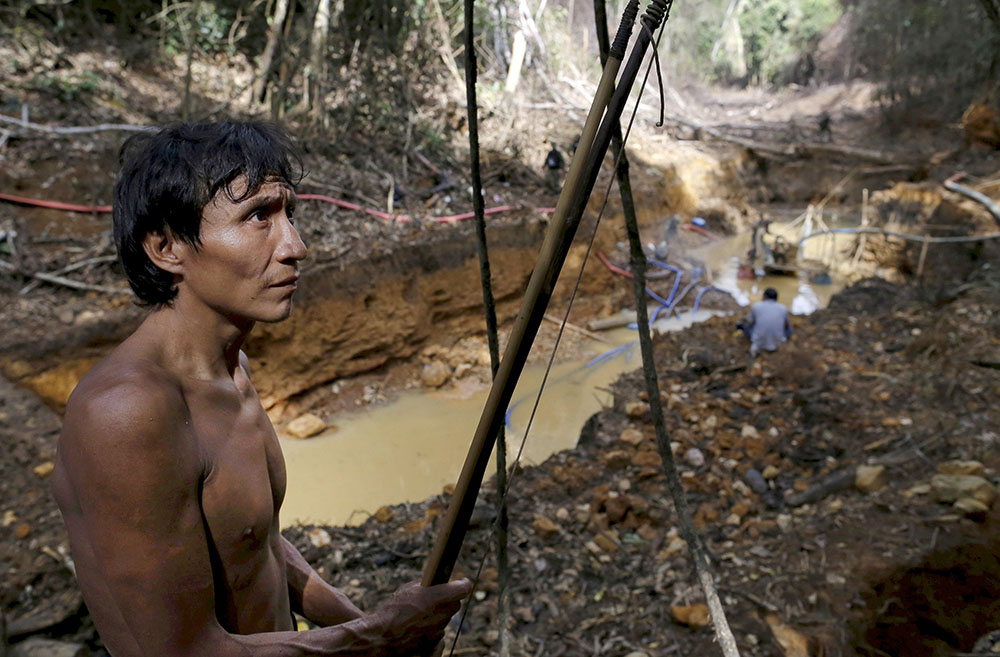
A Yanomami man in 2019 stands near an illegal gold mine on Indigenous land in the heart of Brazil's Amazon rainforest. (CNS/Reuters/Bruno Kelly)
Hekurari also said the invaders brought malaria with them.
"They destroyed forest areas and brought the disease," he said, adding that as many as 1,500 malaria cases have been diagnosed every month among the Yanomami in recent months.
"We see and hear planes and helicopters flying all day long in our territory," he said. "They move tons of materials and equipment every day."
In October, two Yanomami children, ages 4 and 5, who were playing by a riverbank were killed when a mining dredge swept them into the river's deeper water and swift current. The circumstances are not clear, but observers believe they were pulled into deeper water by the dredge's suction hose.
"Yanomami kids learn how to swim as soon as they can walk. Those kids knew how to swim. They were killed by a machine. It was not an accident," Hekurari said of the case, which is still being investigated by the police.
Hekurari fears the effects of mercury on his people's health. A recent study by the Oswaldo Cruz Foundation, a governmental health research agency, showed that 60% of the Munduruku people, in the state of Pará, have higher levels of mercury in their blood than the maximum recommended by the World Health Organization.
Franciscan Sr. Laura Vicuña Manso, a member of CIMI in the state of Rondônia, said mining also creates internal conflicts in indigenous territories, pitting anti-mining and pro-mining members of the communities against each other.
"Mining is always a source of conflict," she told EarthBeat. "And it also impacts the indigenous groups living in isolation."
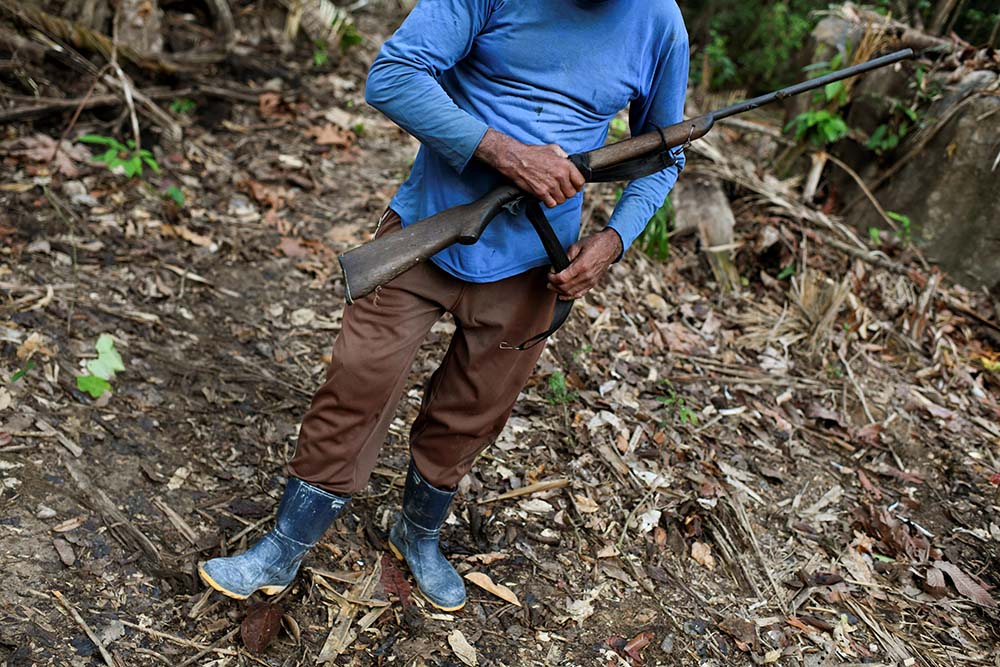
A miner poses with a shotgun at an illegal gold mine within an environmental preservation area in the Amazon rainforest, in Itaituba, Pará state, Brazil, Sept. 5. (Newscom/Reuters/Lucas Landau)
The impacts of illegal mining stretch far beyond the areas where the miners work, Greenpeace's de Aguiar said, as some successful miners invest their money in cattle ranches in the Amazon — leading to more deforestation and emission of greenhouse gases.
Meanwhile, people living in communities in the mining areas do not reap benefits.
"The city of Itaituba, in the state of Pará, has been a center of mining for 50 years. If mining really brings progress, it should be a city comparable to London," de Aguiar said. "But it's not — it's a rather poor city."
Church organizations like the Mining Commission and the Pastoral Land Commission not only denounce the illegal miners operating in the Amazon, but they also try to promote economic alternatives in the region.
"With the high international prices of gold, many traditional communities suddenly became mining communities. We have been trying to stimulate other forms of production that will allow good living conditions, based on agroecology and local production," Bossi said.
Meanwhile, the bishops' Mining and Integral Ecology Commission has been campaigning to raise awareness among people who purchase gold about the impacts of mining in the Amazon — much like campaigns aimed at stopping the purchase of "blood diamonds" from Africa. Bossi and Jesuit Fr. Thomas Reese raised the issue during the Synod of Bishops for the Amazon region in October 2019, when they suggested that the church stop using liturgical vessels made of gold.
But with the international price of gold driven higher by the pandemic, illegal mining in the Amazon basin is unlikely to end soon. And even if it did, the land devastated by mining will be slow to recover, scientists say.
Even if mining stopped today, the mercury pollution would linger for decades, de Aguiar said, adding, "Decontamination takes a long time."








